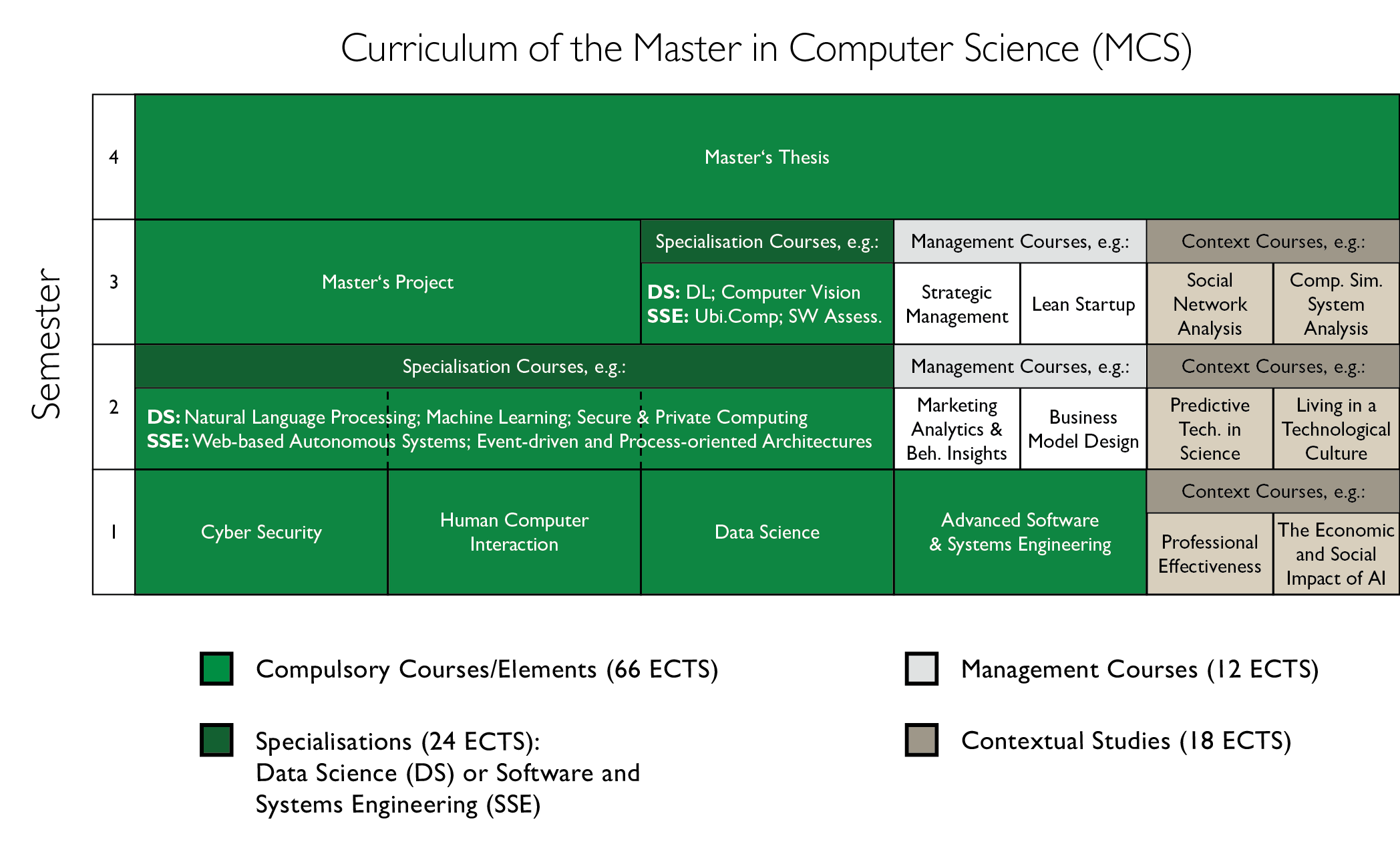Our Curriculum


The Master in Computer Science is designed to be studied in four semesters (120 ECTS). You will attend compulsory courses in Computer Science, select among the specialisations, and enrich your curriculum with management and entrepreneurship courses, as well as electives from the contextual studies of the University of St.Gallen.
In the following, we present the curriculum based on its structure. The primary visualisation of the curriculum is split into three main areas: The green area features the computer science courses (90 ECTS, 75%). The white areas stand for management courses (10%), and the beige ones represent context courses (15%). Each area focuses on developing different competencies. Namely, the computer science courses focus on technical competencies with the opportunity to specialise in either Data Science/AI or Software and Systems Engineering. The management courses foster business acumen, and the context courses develop and sharpen our students' reflective competencies. Together, this combination of competencies create a potent mix of practical skills, business skills and societal understanding.

In the first semester you will attend four mandatory courses, which together form the basis of the programme.
Within the core electives for Computer Science you will choose between one of the specialisations offered: Data Science or Software and Systems Engineering. Within the chosen specialisation you will earn at least 18 ECTS, with the option of taking 6 ECTS credits worth of courses in the other specialisation.
Data Science, including: Maching Learning, Deep Learning, Natural Language Processing with Deep Learning, Computer Vision, Secure and Private Computing, Advanced Databases.
Software and Systems Engineering, including: Software Asessment: From Planning to Experimentation, Event-driven and Process-oriented Architectures, Ubiquitous Computing, Web-based Autonomous Systems, Programming Languages
The Master's project will enable you to combine your skills and knowledge obtained during your Computer Science education and apply it to a software engineering project. The project takes place in the 3rd semester and is conducted in groups. During the project you will be supervised by one of our professors and her/his team of researchers. The project can be executed in collaboration with industry or partner institutions.
The Master’s thesis covers the entire 4th semester and enables you to concentrate on a complex research question within a topic in the field of Computer Science. While the Master's project is geared toward practice, whereas the Master's thesis is a research-oriented project. You will work on the thesis individually, but you will be closely supervised by a faculty member and her/his research team. An excellent Master's thesis gives you the opportunity to pursue an academic career.
For your management courses, you can choose between a wide range of courses offered within the HSG portfolio. Here you will find courses on topics such as leadership, entrepreneurship, finance, marketing and strategic management. Some of the courses are tailored to the Computer Science programme, others are offered by other master programmes at the University of St.Gallen.
As a unique and valuable element of each Master’s programme in St.Gallen, the contextual studies offer a wide range of topics covering social, economic, and legal aspects of technology. The purpose of the context courses is to foster reflection competencies. Students reflect on what they learned within a differnt context. The courses may include topics such as history, philosophy, psychology or ethics. A wide selection of small courses are offered and you will take these courses together with students across all Master programmes, which fosters integrative thinking.